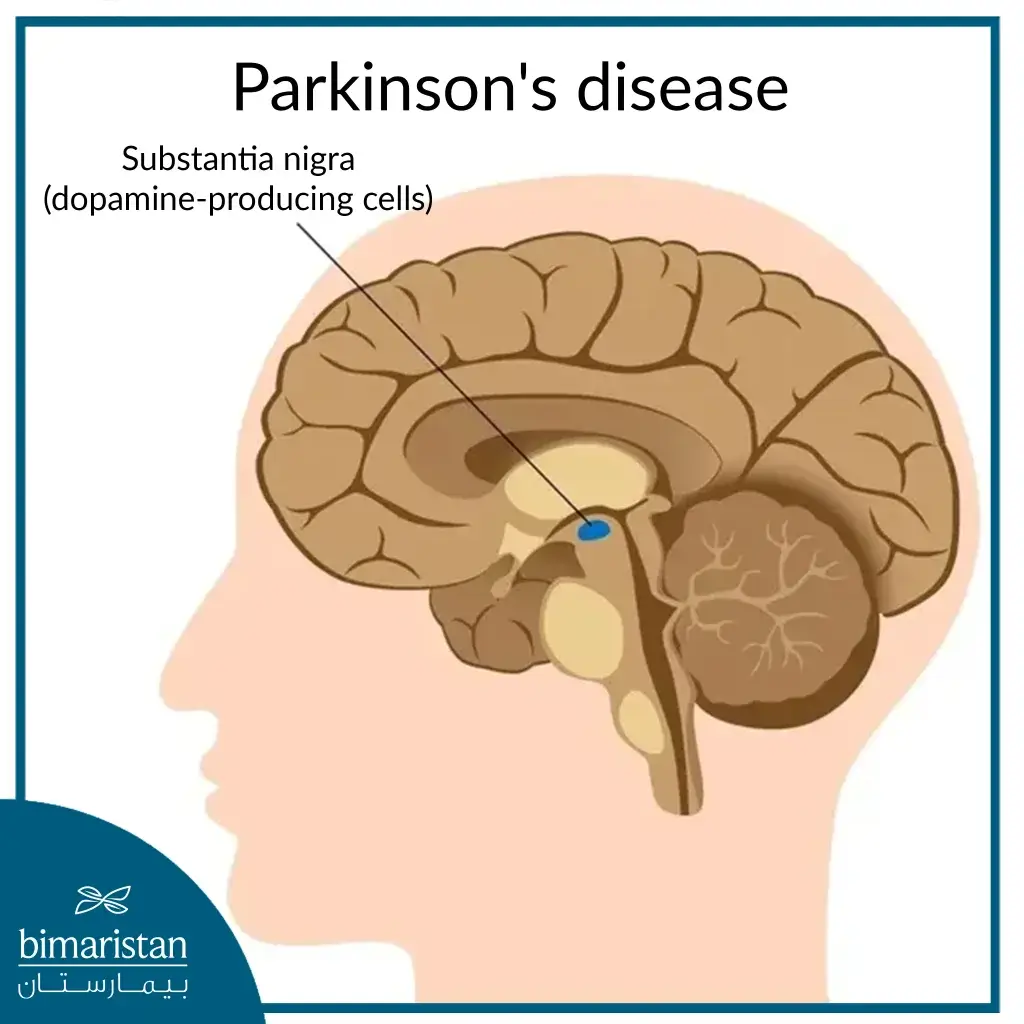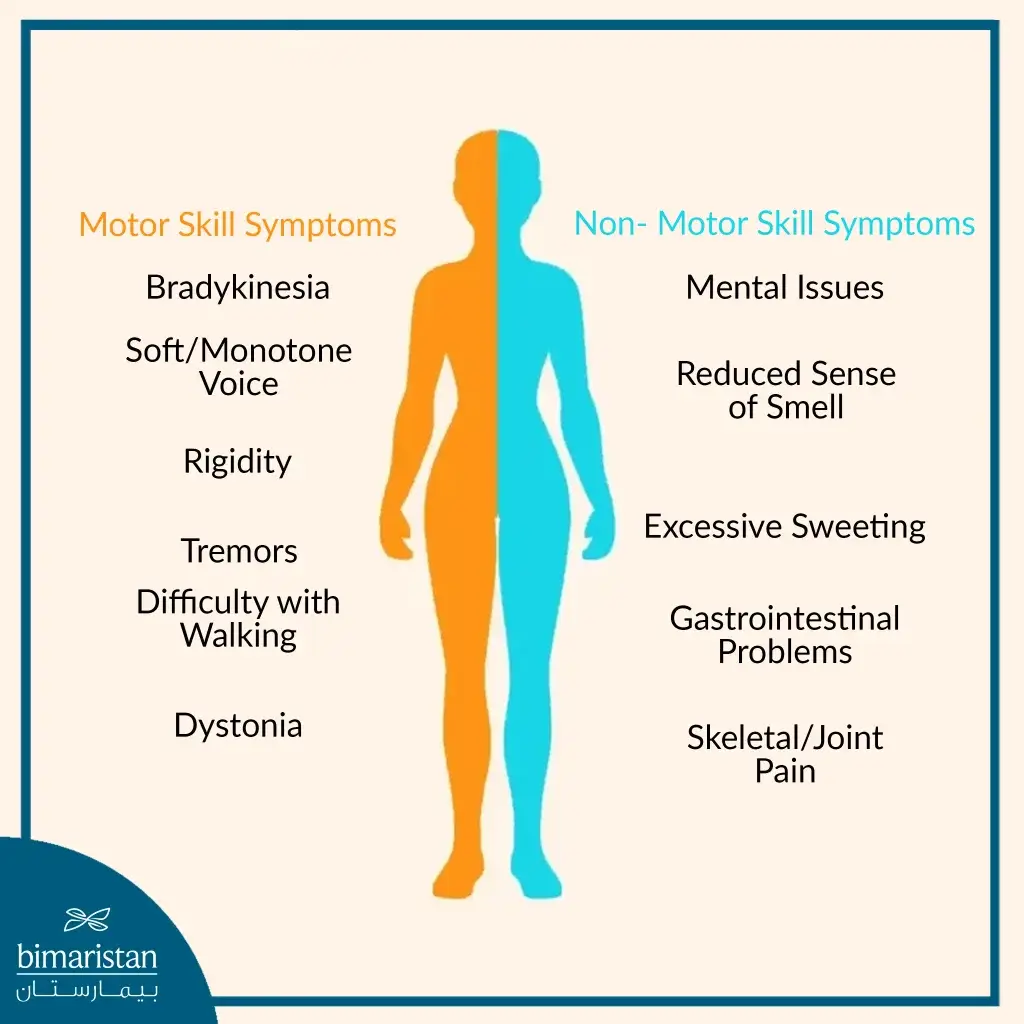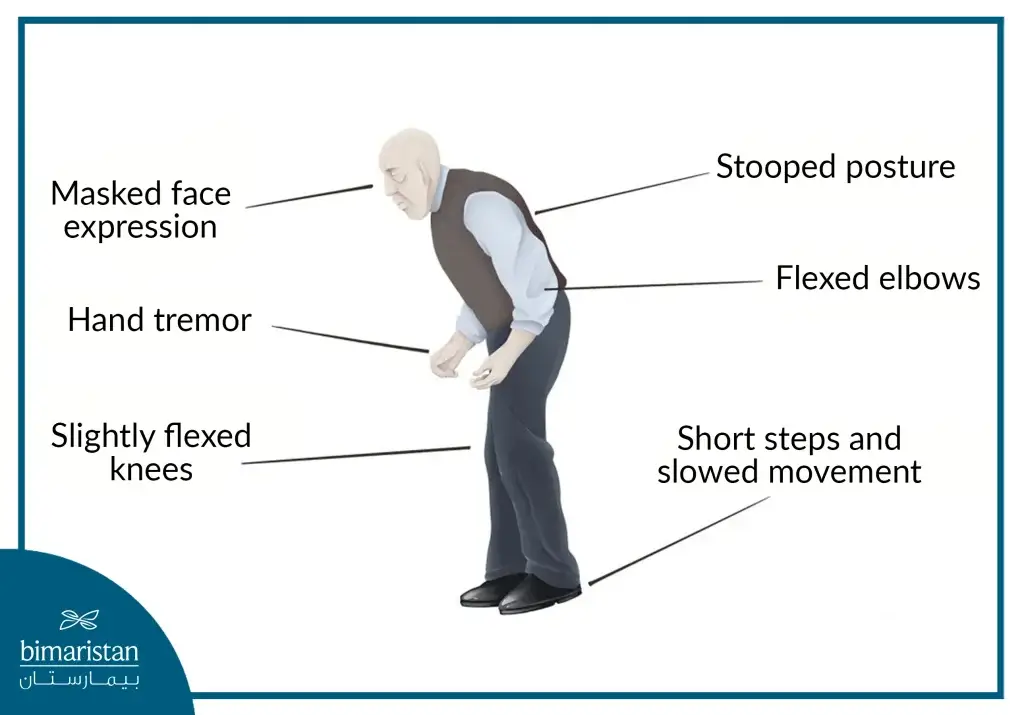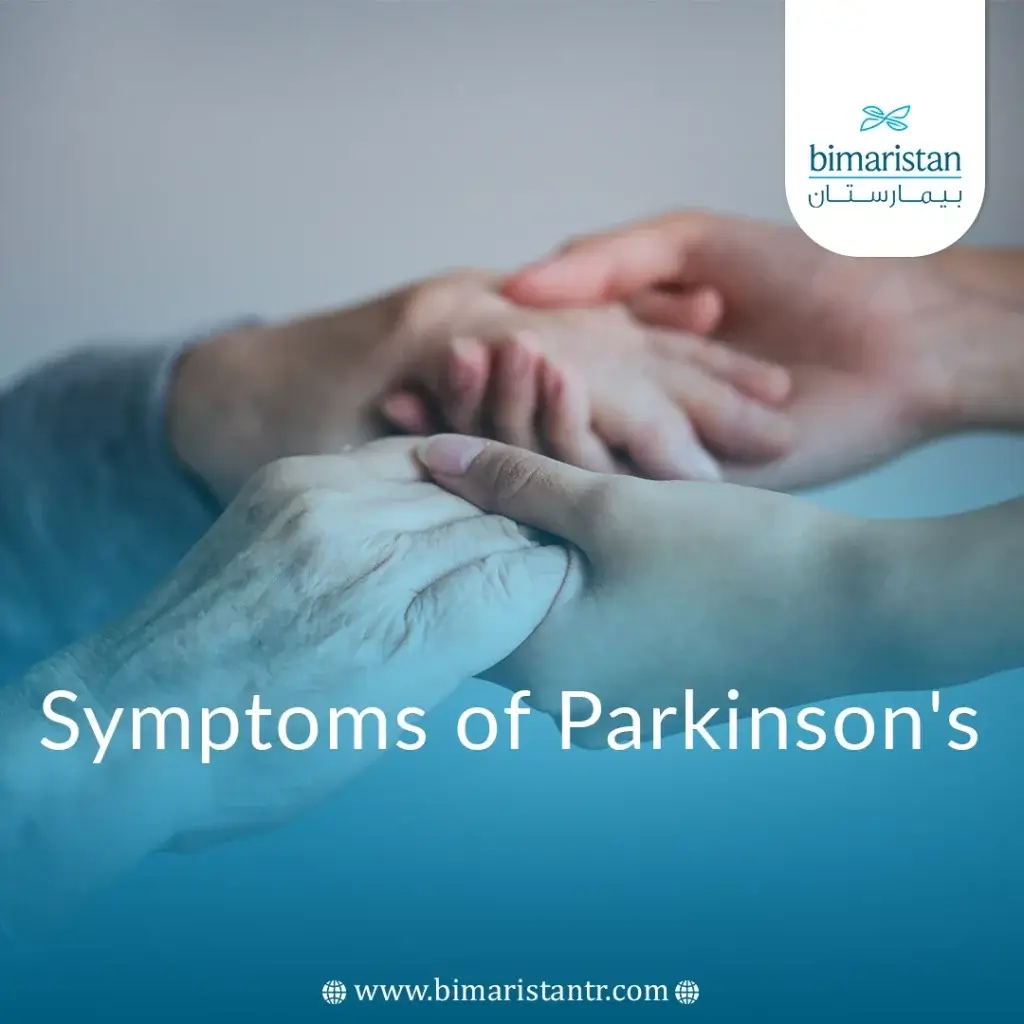Symptoms of Parkinson’s disease result from a disorder of the nervous system responsible for movement in the brain, causing motor symptoms to appear in addition to other non-motor symptoms.
Symptoms of Parkinson’s Disease
Parkinson’s disease is known to be part of a group of degenerative diseases with motor symptoms that appear in elderly patients; this belief is not entirely correct, as Parkinson’s disease has non-motor symptoms that appear long before the motor symptoms.
In a few cases, Parkinson’s may also affect people of a younger age as a result of certain genetic diseases that manifest as Parkinsonian symptoms.
The symptoms of Parkinson’s disease are not limited to Parkinson’s disease alone; many diseases and conditions can cause people to develop symptoms of Parkinson’s disease.
As mentioned above, the symptoms of Parkinson’s disease include motor symptoms and non-motor symptoms, both of which are caused by the death of neurons in the substantia nigra, which makes dopamine in the brain, leading to the onset of these symptoms.

Non-motor symptoms of Parkinson’s disease
The non-motor symptoms of Parkinson’s disease may start years before the motor symptoms appear, and this helps us to detect the disease early in some cases.
Non-motor symptoms of Parkinson’s disease include:
- Reduced sense of smell: The patient is unable to distinguish odors for a long time and not transiently as in the common cold.
- Anxiety, depression, hallucinations: These are just a few of the psychological symptoms experienced by early-stage Parkinson’s patients.
- Insensitivity and loss of the ability to make sound mental judgments.
- Constipation and urinary issues: This is due to an imbalance in the coordination and neural organization needed for defecation or urination.
- Sleep disorders: Hypersomnia, for example.
- Sexual issues: Both sexes have a lack of desire and erectile dysfunction in men, and this affects marital life.
- Difficulty chewing and swallowing: This can lead to choking, and drooling is also seen in Parkinson’s patients.
- The patient’s voice is low-pitched and difficult to pronounce. There is hesitation at the beginning of the speech, and the patient’s entire voice is in one tone without changing pitch during the speech.
- Dizziness and fainting: This is when standing due to orthostatic hypotension in Parkinson’s patients.

Parkinson’s Disease Motor Symptoms
Parkinson’s disease often starts asymmetrically, affecting one limb initially before progressing to involve others. The symptoms of Parkinson’s primarily center around movement disorders and motor system changes, though non-motor effects also occur.
Core Symptoms of Parkinson’s
- Bradykinesia:
- The most common and significant symptom is marked by slowness in initiating and performing movements.
- Tremors:
- A hallmark symptom is characterized by resting tremors in the hands, fingers, feet, jaw, or chin. These tremors disappear with intentional movement and do not typically affect the head.
- Small Handwriting (Micrographia):
- Due to fine motor control issues, writing becomes smaller, slower, and more difficult.
- Muscle Coordination Challenges:
- Tasks like buttoning a shirt, tying shoes, or rolling over in bed become increasingly difficult.
- Muscle Stiffness:
- Prolonged muscle rigidity leads to stiffness in the body or limbs, impairing movement.
- Loss of Facial Expression:
- Known as “masked face,” rigidity prevents the patient from expressing emotions through facial movements, often causing reduced blinking.
- Balance Issues:
- Loss of postural reflexes makes patients prone to falls, as they struggle to regain balance after even minor disruptions.
- Slow Movement Initiation:
- A neurological delay makes starting any movement appear hesitant or reluctant.
- Parkinsonian Gait:
- Characterized by leaning forward, bent elbows and knees, short shuffling steps, and a lack of arm swing while walking.
Recognizing these symptoms of Parkinson’s early is vital for effective management and improved quality of life.

Causes of Parkinson’s Disease
There are many causes of Parkinson’s disease, but most are due to damage to the central nervous system (brain) and often have the same symptoms.
Some triggers may differ in the speed of onset and progression of these symptoms or in the characteristics of some of them, which leads us to the cause:
Idiopathic Parkinson’s disease
Parkinson’s disease, which affects people with an average age of 60 (starting in the fifth decade of life), most commonly involves 80% of Parkinson’s cases, in which mutant proteins accumulate in the dopamine-producing nerve cells in the substantia nigra and basal nuclei of the brain, causing them to die (these areas are responsible for movement in the body).
As a result, there is a lack of dopamine in the nervous system, and the nervous system is disrupted, showing symptoms of bradykinesia and Parkinson’s with sleep disturbance and difficulty walking.
The onset of Parkinson’s disease is progressive over a period of years, and the symptoms of Parkinson’s disease start out mild and then increase in severity until it reaches very severe stages in which the person is unable to perform the simplest movements or is unable to make normal mental judgments.
Cerebral vascular disease leading to Parkinson’s disease
Plain blood clots in the arteries feeding the dopamine-producing areas lead to death and cerebral infarction (neurodegeneration) in these areas, leading to the development of Parkinson’s disease.
The severity of Parkinson’s disease depends on the size, location, and function of the infarcted area; injury to the substantia nigra in the brainstem will lead to Parkinson’s disease.
Medications that cause Parkinson’s-like symptoms (pharmacologic Parkinsonism)
There are many medications that affect dopamine levels and disrupt them in the nervous system, as a result of which symptoms of Parkinson’s disease appear:
- Metoclopramide: Used in the treatment of vomiting and gastroesophageal reflux disease.
- Sodium valproate: Used to treat epilepsy.
- Tetrabenazine: Used in the treatment of hypermobility diseases such as Huntington’s disease.
- Antipsychotic medications.
- Lithium: A psychiatric medication for the treatment of bipolar disorder.
- MPTP: A substance found in cheap, poorly made drugs.
Degenerative diseases leading to Parkinson’s disease
The mechanism of these diseases is the death of a specific nerve tissue, which affects the patient’s quality of life and leads to symptoms related to the damaged area (memory loss, for example, if the area responsible for it is damaged).
In these diseases, nerve tissue damage may extend to other areas, including areas responsible for coordinating movement, leading to symptoms of Parkinson’s disease (Parkinson’s disease) due to a lack of dopamine production.
Parkinson’s symptoms are caused by one of the following degenerative diseases that affect the body:
- Alzheimer’s disease
- Dementia with Lewy bodies
- Progressive supranuclear palsy
- Multiple System Atrophy
- Corticobasal degeneration
Parkinson’s disease is hereditary
Parkinson’s disease can occur as a result of certain genetic diseases that damage dopaminergic cells in the nervous system as a result of mutations in the human genome.
These genetic diseases include the following:
- Huntington’s chorea
- Wilson’s disease
- Spinocerebellar ataxia
Read the following medical article on Parkinson’s neuropathy to learn about the diagnosis, drug treatment, and surgical procedures for Parkinson’s disease in Turkey.
Bimaristan Medical Center provides medical advice to improve your life and guides you to the best doctors in Turkey who can treat Parkinson’s disease with modern methods such as deep brain stimulation. Do not hesitate to contact us, and always remember that preventing Parkinson’s disease is better than treating it.
Sources:

